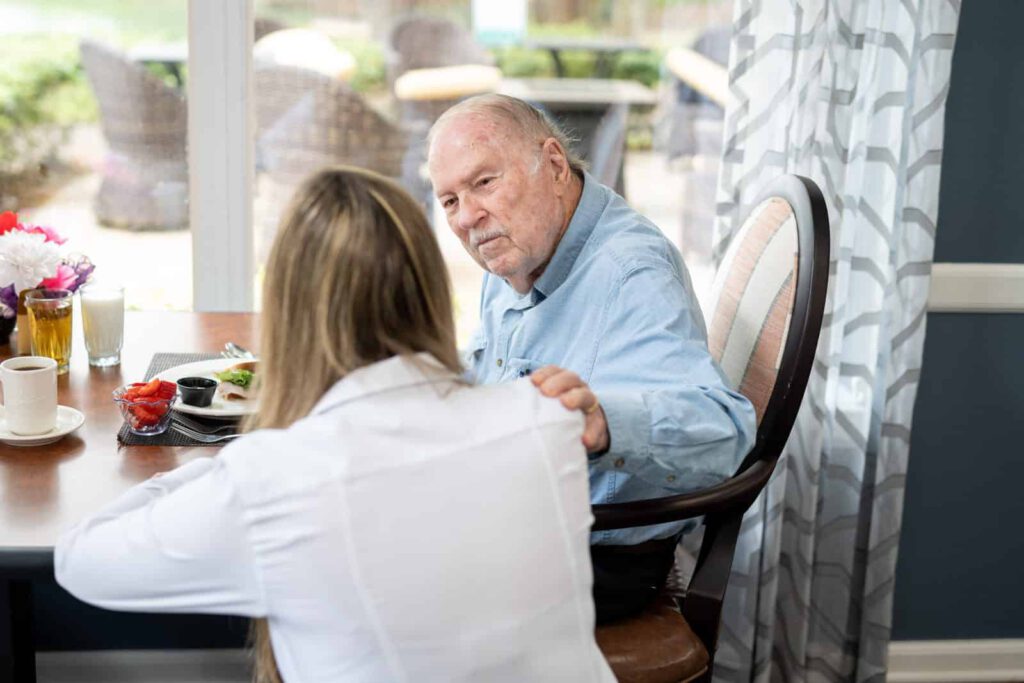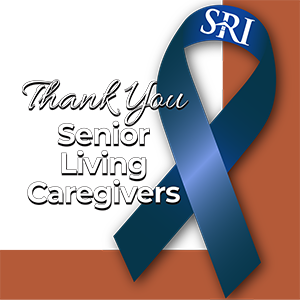Posted in: Health
When her grandfather gets out of bed and is unable to fall asleep for hours at night, Stella knows that he is struggling with anxiety. Sometimes his heart will race, and he’ll be preoccupied with the noises he hears outside, concerned about whether the doors are locked and the house is secure. It began shortly after his wife passed away, and it got worse with time until they addressed the issue with his doctors. Even with treatment, her grandfather still has bad days sometimes, but Stella has seen so much improvement in his symptoms. And she can tell that he feels much more confident and connected with his life as a father and grandfather.
We can experience anxiety occasionally as a normal response to stressful situations. In fact, anxiety can be an important warning sign that something is wrong and help us protect ourselves from danger. But when it arises more often, is disproportionate to stressors, and disrupts an aging adult’s experience and quality of life, anxiety becomes a serious disorder that should be treated with great care. Fortunately, compassionate, holistic treatment for anxiety in the elderly is readily available, and you can help an aging loved one to access this care.
Symptoms of Anxiety in the Elderly
There are many different types of anxiety disorders, including generalized anxiety disorder, social anxiety disorder, panic disorder, obsessive-compulsive disorder, and post-traumatic stress disorder. None of these disorders should be dismissed as just a normal part of the aging process. Symptoms of anxiety disorders can be very distressing, and older adults require special care to minimize and prevent its symptoms, which can include:
- Shakiness
- Difficulty breathing
- Dizziness
- Lightheadedness
- Sweating
- Nausea
- Digestion problems
- Chest pain
- Headaches
- Eye and vision problems
- Muscle tension or soreness
- Fatigue
- Confusion
- Irrational thoughts
- Forgetfulness
- Nightmares
- Scary thoughts
- Irritability
- Avoidance of activities, places, people, and even thoughts that trigger anxiousness
- Changes in weight, appetite, or eating habits
- Sleep disturbances, including sleeping too much or too little
- Resistance to leaving home
- Withdrawal and isolating behavior
- Obsessive thoughts
- Compulsive behavior
- Panic
- Abuse of substances
Not all of these symptoms must be present in order for an older adult to be diagnosed with an anxiety disorder. However, if your aging loved one exhibits even one or more of these symptoms, it’s a good idea to talk to their doctor about how their discomfort can be addressed.
If not dealt with, symptoms of anxiety can escalate and a senior can experience a weakened immune system, muscle tension, high blood sugar, nervous system fatigue, digestion problems, ulcers, cardiovascular problems, and difficulty breathing, among many other health complications and possibilities. They may also be at greater risk of developing other mental health complications, such as depression and thoughts of suicide. Along with adequate treatment, we can consider some of the stressors in their lives and help ease some of the burdens on our aging loved ones.
Common Triggers of Anxiety in Seniors
While anxiety doesn’t necessarily have a specific trigger, it often arises from or is exacerbated by specific environmental and situational factors. With age, we encounter challenges and stressors that we may not have faced before. Transitions themselves can be difficult, and older adults can be facing significant changes that can contribute to the development or escalation of anxiety. If we can narrow in on some of the common triggers of stress and anxiety in the elderly, we can keep an eye out, anticipate anxious responses, and mitigate challenges. By creating a more positive and supportive environment for aging adults, they can cope with anxiety more effectively and navigate treatment more gracefully.
Here are some of the anxiety triggers to look out for that are common among older adults:
- Financial insecurity
- Health problems
- Dementia
- Loss of independence
- Role reversal
- End-of-life planning
- Grief and loss
- Immobility
- Chronic pain
- Changes in sensory perception, including vision loss and diminishing taste and smell
- Isolation
With greater awareness of your loved one’s particular issues, you can offer support or find the support they need in these areas. For example, you might help to set them up with professional money management financial services, reconnect with old friends or community activities to reverse isolation, or practice exercises to support chronic pain management.
Treatment and Coping Strategies for Anxiety in Older Adults
If you think that your aging loved one might be experiencing an anxiety disorder, it’s time to seek out medical care—the sooner, the better to address their symptoms. A psychiatrist will be able to make an accurate diagnosis and identify the best treatment options based on that assessment. A care plan for anxiety may comprise a combination of medication and therapy, but the doctor will be able to determine the very best course of treatment for the individual and monitor their recovery progress over time.
As with so many other physical and mental health disorders in seniors, care for anxiety should consider the whole person: their home environment, existing support systems or lack thereof, level of isolation, mobility, level of independence and ability to manage necessary daily tasks, health history and active illnesses, and, of course, their particular preferences for care. A professional care manager is a great resource for assessing all of these elements and developing an environment for them to thrive in. A care manager considers every relevant detail that will bear on a senior’s quality of life. They can help you to develop an individualized plan for your aging loved one that addresses everything from home safety to nutrition to social engagement to medication management and regular therapy sessions. They can help to arrange on-site or in-home behavioral health appointments.
They can also refer you to a clinician if your aging loved one doesn’t already have a doctor who is prepared to treat their anxiety comprehensively. And you can advocate for an aging adult by offering a doctor your observations of their symptoms and by asking what you can do to support your loved one on a regular basis.
For example, you might:
- Act as a good listener and improve your communication overall with strategies from a communication style quiz.
- Look into local counseling services or in-home psychotherapy to support an aging adult through a range of challenges and especially anxiety.
- Help to sign them up for a social day program for positive community support, mental and creative stimulation, group exercise, and more attention from knowledgeable caregivers
It’s important that your aging loved one doesn’t have to journey through their anxiety alone. Likewise, as a caregiver, you need not operate alone, as there is a range of support systems for caregivers. Start to explore the treatment options for your loved one’s anxiety. Talk to them about the options they feel comfortable with and about the life they would like to create in recovery from anxiety. That revitalized life can start today.






for
special events
and offers